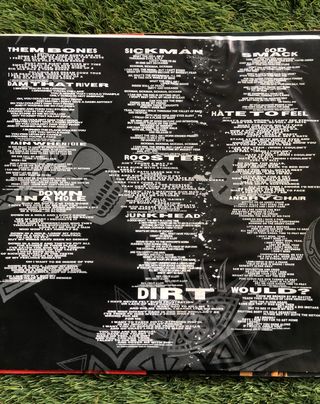


One listen to Dirt reveals a man constantly spilling his guts and bleeding out on record, as if he had nothing to lose any time he approached the mic. It seems as though Layne Staley never had a problem expressing such frankness with his lyrics and vocals. Alice in Chains’ masterpiece served - and still serves - as proof that being open and revealing about personal conflict can be the best form of therapy in one’s darkest moments.

What finally inspired me to face the whole ordeal head-on? Dirt. As it turns out, 2022 was that someday I wrote everything that needed to be spelled out to the letter, and it was gut wrenching. Yet it was always there, and no amount of avoiding it would have changed the fact that I’d need to confront it directly someday. It’s as if I wanted to address the problem while skirting around it at the same time perhaps it was a mechanism to maintain some subtlety in my writing, or perhaps I was unwilling to confront the issue directly. For me, writing a new piece always starts with one difficult question: “how much do I want to reveal to the reader and how much do I want to leave up to interpretation?” From the time my alcoholism started to the time it (thankfully) ended, I always left a few breadcrumbs here and there about the subject in my poetry.

Last month, I published one of the hardest poems I’ve ever had to pen. The album holds out little hope for its protagonists (aside from the much-needed survival story of "Rooster," a tribute to Cantrell's Vietnam-vet father), but in the end, it's redeemed by the honesty of its self-revelation and the sharp focus of its music.Review Summary: A masterpiece built on personal demons and private hells. Even given its subject matter, Dirt is monstrously bleak, closely resembling the cracked, haunted landscape of its cover art. Sometimes he's just numb and apathetic, totally desensitized to the outside world sometimes his self-justifications betray a shockingly casual amorality his moments of self-recognition are permeated by despair and suicidal self-loathing. Staley's stark confessional lyrics are similarly effective, and consistently miserable. Cantrell's technically limited but inventive guitar work is by turns explosive, textured, and queasily disorienting, keeping the listener off balance with atonal riffs and off-kilter time signatures. Not every song on Dirt is explicitly about heroin, but Jerry Cantrell's solo-written contributions (nearly half the album) effectively maintain the thematic coherence - nearly every song is imbued with the morbidity, self-disgust, and/or resignation of a self-aware yet powerless addict. It's a primal, sickening howl from the depths of Layne Staley's heroin addiction, and one of the most harrowing concept albums ever recorded. Dirt is Alice in Chains' major artistic statement and the closest they ever came to recording a flat-out masterpiece.


 0 kommentar(er)
0 kommentar(er)
